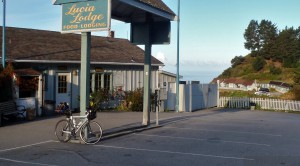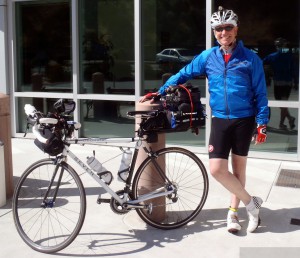Day 2 – Carmel to Lucia
A Closed Highway is Good News
A good traveler has no fixed plans, and is not intent on arriving.
 - Lao Tzu
 When I first planned this trip, the first day out of Carmel was 110 miles down the coast to Cambria. I figured I’d have tailwinds, and why not start off with a bang? But spring rains washed the highway out, (as they often do), so the road was closed at about 60 miles or so south of Carmel.
When I first planned this trip, the first day out of Carmel was 110 miles down the coast to Cambria. I figured I’d have tailwinds, and why not start off with a bang? But spring rains washed the highway out, (as they often do), so the road was closed at about 60 miles or so south of Carmel.
At first this messed with my head – making me change the route and the schedule. But the more I thought about it, the more I kind of liked the change. It let me dawdle a bit in Carmel, and dawdle a lot in Lucia. Why burn down the coastline all day, when I could sit at Lucia and enjoy the Pacific?
I start the day with arm warmers and leg warmers on, as well as my warm rain jacket. That’s how I’ll end the day as well. It’s chilly all day long. And that NW tailwind that always blows this time of year? Not today – a south wind for Neil today. Hmmm, I’m having troubled memories of last year’s ride across Kansas against winds all the way…
 The further south I go along the highway, the more the traffic thins out. This makes me realize how lucky I am to have a road closure up ahead, since it reduces traffic. The road is narrow and curvy in places, and I love less traffic! It almost makes me forget the headwind. Almost.
The further south I go along the highway, the more the traffic thins out. This makes me realize how lucky I am to have a road closure up ahead, since it reduces traffic. The road is narrow and curvy in places, and I love less traffic! It almost makes me forget the headwind. Almost.
As the day progresses, the wind swirls and shifts, and eventually I’m able to tune it out. Of course, the fact that I’m riding through some of the most beautiful countryside on earth makes it easier to tune it out.
I had assumed that the road followed the coast all the way, but there’s a section that moves through a state park in Big Sur, and you’re away from the coast for 5 or 10 miles. While the coast is beautiful for sure, it would be a tragedy to ride along this highway and not get to experience the deep and lush Redwood forest in Big Sur.
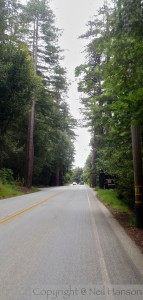 Ancient Wisdom
Ancient Wisdom
“Trees are sanctuaries. Whoever knows how to speak to them, whoever knows how to listen to them, can learn the truth. They do not preach learning and precepts, they preach undeterred by particulars, the ancient law of life.”
- Hermann Hesse, Wandering
“Why are there trees I never walk under but large and melodious thoughts descend upon me?”
-Â Walt Whitman, Song of the Open Road
It’s an interesting mindset change that I notice as I’m moving through the forest instead of the coast. I feel more relaxed, more complete. I stop a couple times in places where I can touch particularly large Redwoods, and stand there touching them with my hand. I really do think ancient trees share a wonderful energy that vibrates at a different wavelength than we’re used to. Their time horizon is beyond what we can imagine, and the things that feel significant to us are generally trifling to them I imagine.
I close my eyes, and can imagine Ents talking in deep and slow voices…
I’m reminded of a grandfather and a grandmother of mine – from different sides of the family. He lived to be almost 100, and she lived to be 101. Sitting with them always wrapped me in a different sense of time and significance than sitting with other folks. The world they were part of was much bigger and broader than the world I was part of. I hadn’t lived enough years yet to have such a broad world.
Yet, sitting with them, I could always feel their world. The breadth of it would wrap around me and make me feel a small part of it for the time we sat together. At 57 years old, I can only begin to feel that more broad world inside myself. The things that seemed to urgent and critical to me when my children were young have a different perspective to me now, and aren’t as urgent and critical. I’d be a better parent today, I think, than I was 30 years ago.
That’s why we need extended families. That’s why we need grandparents that help in the raising of children. Our perspective is more broad, and we’ve (hopefully) gained a bit of wisdom and understanding along our journey. While our eyes have often started to dim a bit, we see much more clearly than was possible when our world was so much smaller and our eyes so much more clear.
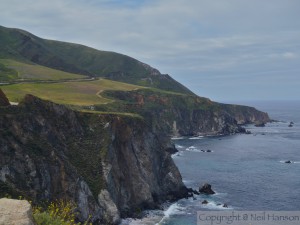 I miss those grandparents, and I think of them as I lay my hand on the trunk of an ancient Redwood. I feel as-though some of that “big view†energy is flowing within me, and I imagine them quietly and patiently touching me back through that trunk, nodding slowly and smiling, staring from a world too big for me to imagine…
I miss those grandparents, and I think of them as I lay my hand on the trunk of an ancient Redwood. I feel as-though some of that “big view†energy is flowing within me, and I imagine them quietly and patiently touching me back through that trunk, nodding slowly and smiling, staring from a world too big for me to imagine…
I stop at a little settlement of sorts – really just a place where there’s a restaurant and small grocery. A bit touristy for sure, but a homey feel to it. The gardens are just covered in plants, and I’m reminded again of the steady, moderated coastal climate here.
I’ve been passing other cyclists to this point – folks who appear to be supported based on the lack of gear on their bikes. While I’m at this little stop, several of them ride up and dismount. Listening to them talk to one another and others, I ascertain that they’re part of a group that’s riding from San Francisco, down the coast to a bit north of LA, then heading east, back through Colorado, and eventually all the way to Newfoundland. It’s a 2 or 3 month journey for them, organized by some company who’s done this in other countries as well. I think about going over and talking to one of them, but decide instead to get on the bike and head up the road.
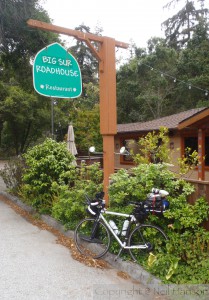 The road climbs and falls a bit while it’s back in the forest. Nothing long or too steep, just nice gentle grades. Of course, with the extra weight on my bike, everything is feeling steep to me on this second day out. I continue to pass cyclists, who I assume are part of this group. By the time I get to the top of a fairly long grade, I’ve probably passed about 10 or 12 of them. I watch in my mirror as one of them seems to hang several hundred yards behind me – sometimes coming closer but then falling back depending on the grade. At one particularly nice place I pull over to take a picture by the side of the road, and wait for him to catch up.
The road climbs and falls a bit while it’s back in the forest. Nothing long or too steep, just nice gentle grades. Of course, with the extra weight on my bike, everything is feeling steep to me on this second day out. I continue to pass cyclists, who I assume are part of this group. By the time I get to the top of a fairly long grade, I’ve probably passed about 10 or 12 of them. I watch in my mirror as one of them seems to hang several hundred yards behind me – sometimes coming closer but then falling back depending on the grade. At one particularly nice place I pull over to take a picture by the side of the road, and wait for him to catch up.
Turns out his name is Jim, and he’s from Canada. He’s part of the group, and he fills me in on more of the details. Turns out they’re following almost exactly the same route I am back to Colorado, although when they get to Colorado they’ll cross the center of the state rather than the southern part of the state as I will. Rather than staying in motels, they stay mostly in campgrounds, occasionally staying in a hostel or motel. Jim seems to like the idea of camping most of the time, though in my mind I’m thinkin’ that’s gonna get mighty old mighty fast. Most of these folks I’ve been passing aren’t 25 year-old studs, but middle-agers like myself (though I’d guess Jim to be only 35 or 40.)
Jim and I talk a bit now and again over the next miles, eventually arriving at the little town of Lucia. It’s starting to rain a bit, and Jim has another several miles to ride to his campground. We say our good-byes and good-lucks, and I watch him ride off into the mist, delighted that I’ll be spending my night in a warm motel room overlooking the coast, eating food prepared by someone else…
While Lucia shows up as a town on some maps, it’s really not a town at all. It may have been an actual town in the past, but now all that’s there is a lodge and restaurant. Seems the property has been in the same family’s hands for several generations. They have a great spot – right on the coast – and they offer lodging and dining in a beautiful setting.
In many ways, it’s a shining example of free enterprise, the declination brought on by nepotism, and the arrogance and sense of entitlement that “ownership†inspires all wrapped into a single stop along the highway.
If you ignore price and attitude, and just look at the place, it’s a quaint little spot with a beautiful view. Of course, you’re in Big Sur, so it’s tough to find a spot along the highway that doesn’t have a beautiful view. The food in the restaurant is OK but certainly not great – about what you’d expect in a cafe along the highway. The rooms are tiny little things cut out of a strip-style building – quaint, quite small, and very old. The room I stay in is very run down with a pretty lousy bed and plumbing that not only doesn’t work right, but is in a state of “half-repairâ€. Whoever takes care of that sort of thing will finish the job when they get around to it.
But hey, that’s OK with me, my standards for motel rooms are extremely low. I’m usually happy to stay in a small-town motel that costs $35/night, knowing full-well that it’s gonna be just like this.
The problem is, this room is a couple hundred dollars a night. Really. And the meals are proportionately overpriced. There’s a sucker in every crowd, and this night I resigned myself to being that sucker. I need a warm place to stay for the night, and they have a warm (well mostly) room for me to rent. I’m able to look at the proprietors in a light that accepts that they’re running a business, and they’ve made choices about how they want to run that business. I don’t like it, but I want what they have to sell, and am willing to pay for it.
Through the evening, I come to see balance in the situation with the Lucia Lodge and the family that runs it. The Lucia family isn’t perfect, and they could use some lessons in customer service for sure. They’re prices are too high by a lot, and they appear to have been blinded by the arrogance of “ownershipâ€. But they’re a family business trying to make a living in a remote area, and I’m OK giving ‘em my business tonight.
After I order, a fella at a nearby table starts up a conversation. Turns out he’s a cyclist too. His name is Dave Meyers, and he lives up in northern California. He’s following the same route I am to Paso Robles tomorrow. We share a bit of good conversation over supper, and I learn quite a bit from him about minimalist touring on a bicycle.
When I started out on this trip, I thought I was carrying a pretty small pack of gear. Something between 15 and 20 pounds. I’d included some “nice to have’sâ€, but felt justified as I kept the total weight down to under 20 pounds (without water of course). Dave carries a tiny little bag that weighs in at about 7 pounds. Less than half my weight.
I’m fascinated by Dave’s approach, and when this trip is over, I’ll continue to correspond with him to learn more about how he travels. For tonight, I’m feeling somewhat cocky – as I was able to pass quite a few cyclists during the day who were far less loaded than me. I’m not yet aware of the attitude change I’ll be experiencing tomorrow, so I simmer in my cocky arrogance while finishing desert…

 When times are good, it said, we should plan for the bad times ahead. When times are bad, we should rejoice in the good times that are coming.
When times are good, it said, we should plan for the bad times ahead. When times are bad, we should rejoice in the good times that are coming.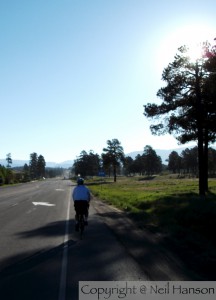 When life drops joy in our lap, we should rejoice in that moment of joy with every molecule of our being. We should savor every little flavor of the joy, and look for ways to multiply it and amplify it and share it with every ounce of our spiritual energy. We should ignore completely the possibility that there may be some moment in the future where we’ll feel spiritually drained and exhausted, utterly dejected, devoid of any joy. We should spend every ounce of ourselves in the joy we’re passing through.
When life drops joy in our lap, we should rejoice in that moment of joy with every molecule of our being. We should savor every little flavor of the joy, and look for ways to multiply it and amplify it and share it with every ounce of our spiritual energy. We should ignore completely the possibility that there may be some moment in the future where we’ll feel spiritually drained and exhausted, utterly dejected, devoid of any joy. We should spend every ounce of ourselves in the joy we’re passing through.












